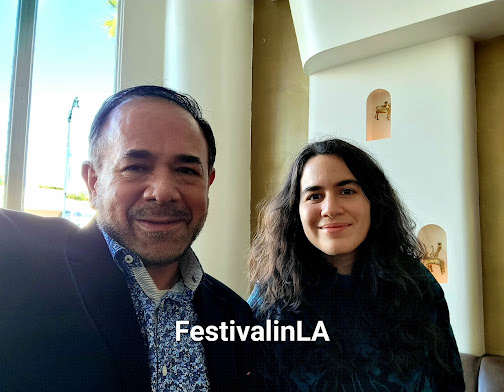By José Alberto Hermosillo
“Clara Sola” is a powerful sisterhood drama from Costa Rica, rich in natural beauty and complex family relationships, infused with supernatural elements rooted in Latin American magical realism. It also deserves recognition.
Over the past fifty years, Latin American cinema has increasingly challenged its traditional standards, leading to a new wave of post-colonial, post-political, and post-structural films that showcase diverse critical voices from remarkable filmmakers.
Following this groundbreaking trend, “Clara Sola” joins other essential and captivating Latin American magical realism classics such as “Eréndira,” directed by Ruy Guerra in 1983, based on the novel “The Incredible and Sad Tale of Innocent Eréndira and her Heartless Grandmother” by Nobel Prize-winning author Gabriel Garcia Marquez; the Mexican culinary classic “Like Water for Chocolate” by Alfonso Arau; the Colombian anti-war film “The Colors of the Mountain;” the Mexican-Spanish multi-award-winning fantasy “Pan’s Labyrinth” by Guillermo del Toro; the Oscar-nominated existentialist film “Biutiful” by Alejandro González Iñárritu; and more recently, the 2019 political thriller “La Llorona” by Guatemalan award-winning director Jayro Bustamante, along with the 2020 Netflix period drama “Tragic Jungle” by Yulene Olaizola, set at the border of Belize and Mexico.
The multi-layered fable unfolds on a small ranch in the remote village of Heredia, near the Poás volcano in Costa Rica. It features Clara, her mother, Fresia, and her niece, Maria. Each woman represents a different generation, set of beliefs, and goals within the story. The film’s protagonist is Clara, beautifully portrayed by first-time actress Wendy Chinchilla Araya, a dancer making her first major acting debut. Wendy Chinchilla exudes complete control over her emotions, confidently engaging the audience with her piercing gaze.
Clara has the gift of communicating with nature and animals—ranging from snakes and insects to her beloved tall white horse. She claims to work for God, and people believe her, while her mother exploits this belief. Clara also suffers from a rare spinal disease that causes excruciating pain, leading her to escape from reality. She keeps herself grounded deep within her mind by connecting with nature.
Clara is physically abused by her repressive and religious elder mother, Fresia (Flor Maria Vargas Chavez). Clara’s precocious niece is Maria, played by Ana Julia Porras Espinoza, who is thrilled about her upcoming quinceañera.
When Maria starts dating Santiago (Daniel Castañeda Rincón), the ranch hand, Clara— a forty-year-old woman who has never been with a man and is on the verge of her sexual awakening— finds herself overwhelmed with emotional pain. A new hostility takes hold of Clara and her niece, partly due to the twenty-five-year age difference and the conflicting feelings each has for the same man.
In “Clara Sola,” the male figure is seen as a “breeding stallion” who can potentially please both the young teen and the older aunt. In Pier Paolo Pasolini’s 1968 drama “Teorema,” the conflicts are straightforward, and the male lead has premeditated sexual advances on every member of a wealthy Italian family. By contrast, in “Clara Sola,” the situation is reversed - women use the rancher only for their pleasure, presenting a very feminist perspective of the film.
 |
| Nathalie Álvarez Mesén, Beverly Hills, California. Photo by José Alberto Hermosillo - FestivalinLA ©2021 |
First-time director Nathalie Álvarez Mesén was born in Stockholm but has strong ties to Costa Rica, her mother’s homeland. She and her family have spent several years living in a Central American country. She studied mime acting in Stockholm and film at Columbia University. She participated in the Berlinale Talents program, the Toronto Film Festival Filmmakers Lab, and the NYFF Artist Academy.
With “Clara Sola,” Álvarez Mesén delivers an impressive debut film. She can direct both non-professional actors and experienced professionals. Álvarez Mesén collaborated closely with Colombian co-writer Maria Camila Arias. Together, they seamlessly contrasted personal, vivid images from their childhood to adulthood, incorporating key themes of the film such as religion, gender roles, machismo, social circles, and inner exploration.
 |
| Critic José Alberto Hermosillo, director Nathalie Álvarez Mesén, Beverly Hills, California - FestivalinLA ©2021 |
Speaking fluently in Spanish after a private screening in Beverly Hills, Álvarez Mesén told me that she felt the project became more religious and spiritual once filming began. The site’s mystical vibe is directly reflected in the movie, and that was when she sensed the deep sense of community needed for her film. This atmosphere is something Hollywood hasn’t fully mastered yet. Foreign directors convey the community’s cultural traits through a more personal connection with the locals’ way of life and customs.
The film, directed, written, shot, and edited by women, was filmed in Costa Rica over 35 days. All editing and post-production took place in Belgium during the pandemic.
Director of Photography Sophie Winqvist Loggins subtly illuminates each scene, framing the shots like open windows that reveal the interior of the forest or from outside to the inner spirit.
Beautifully shot in the vibrant Central American country where Universal Studios created “Jurassic Park,” the Swedish/Costa Rican/Belgian project was one of the best films ever made in Costa Rica. “Clara Sola” was the official Costa Rican entry for the 94th Academy Awards. It premiered at the Cannes 2021 Directors’ Fortnight. It won five Guldbagge Awards (Swedish Academy), including Best Film, Director, Cinematography, and Screenplay. It also received Best Picture awards at festivals such as Cleveland, Nashville, and Denver.
The drama and passion of “Clara Sola” deepen our appreciation for its beauty; the film’s climax is reminiscent of the 1976 cult horror flick “Carrie,” which the director had never seen before her feature film debut. She now takes that as a compliment.
“Clara Sola” is one of those rare films with a slightly feminist perspective, portraying a matriarchal lead as part of a “new normal,” depicting a family that evolves from traditional macho roles to a more inclusive society. Unlike the Mexican horror film “We Are What We Are” from 2010, questions about who will succeed in the patriarchal family hierarchy are central to the story and are reinforced through the dialogue.
“Clara Sola” depicts the male lead as simply an accessory for women to use. It’s a bold move and a very valid feminist perspective for a young female director who is now calling the shots with this extraordinary piece of filmmaking. Nathalie Álvarez Mesén’s next project is “Three Women” for Showtime.
“Roma” Anarchy and Repression in an Epic B&W Mexican Drama
“Birdman or (The Unexpected Virtue of Ignorance)”
IF YOU ARE READING FROM A MOBILE DEVICE, CLICK: view web version FOR OTHER COOL FEATURES SUCH AS TRANSLATE POWERED BY GOOGLE, AN INTERACTIVE FILM FESTIVAL CALENDAR, AND MORE AWESOME ARTICLES.
Festival in LA ©2022


















































